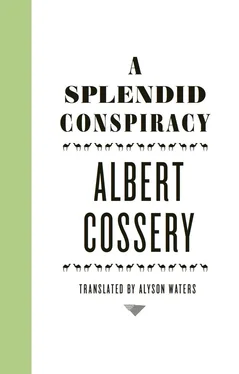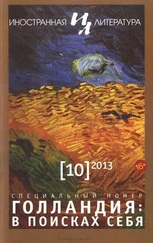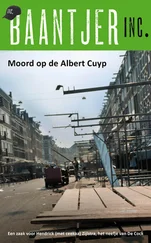“No. He opened the door and slammed it behind him. I stayed outside, alone. I was worried because of all that money.”
Medhat knit his brow and an odd glimmer came into his gaze, but he quickly turned his head so that Rezk could not discern the slightest trace of the suspicion that had just formed in his mind. Rezk’s account threw a dazzling light on the mystery of those disappearances that were all over the city’s news. It was in Wataniya’s brothel — he was now convinced of it — that the notables were disappearing, and an ignorant police force, led by a megalomaniac chief, persisted in believing them to be the victims of a revolutionary conspiracy. He recalled that the owner was not alone in managing her profitable business; she had a husband to help her with her task, a phenomenally strong ex-convict with a physical appearance as noxious as his wife’s, who lived in one of the bedrooms in the rear and who never showed himself in public. Between the two of them, it would be relatively easy to kill a rich client, and divest him of his money and his jewels. The house was surrounded by empty lots perfectly suitable for burying illicit corpses once they had been cut into pieces to prevent identification. The whole thing must have functioned like a factory, or a closed circuit, with no need of recourse to the outside world since the victims came of their own free will. Medhat almost burst out laughing, but he contained himself; he was not crazy enough to shout his discovery from the rooftops. Rezk especially must know nothing about it.
A line of camels, apparently without a driver, crossed the bridge, followed closely by a donkey cart carrying an assembly of female mourners on their way to a funeral, their grieving faces painted blue; from time to time, one of them would begin a series of short wails, like a singer warming up her voice before coming on stage. From farther away, about to drive on to the bridge, a rich man’s calèche, clean and shiny, was approaching; its horse, a noble beast, was walking solemnly in quick time. Visibly, the city was waking up after its siesta. Medhat thought it was time for him to go.
“Well, Rezk, my brother, I’ll say goodbye now! You have opened new horizons for me. I will not be quick to forget this interesting conversation.”
“When will we see each other again?”
“Whenever you’d like. I’m always happy to see you; you know that.”
“Listen, I want you to know something: I’m going to resign. Nothing will keep us from seeing each other after that. There won’t be any mistrust between us anymore.”
“There was never any mistrust on my part. In any case, that’s good news, and I’m happy to hear it.”
Before he left Rezk, Medhat held him tightly against his chest in a pledge of brotherly friendship. It was to Rezk that he owed his sensational discovery and he wanted to thank him in an even more demonstrative way. As he walked away, he turned around several times to smile at him.
Stretched out on a burlap-covered mattress on the floor, Teymour was dreaming of his young saltimbanque. There was nothing luxurious about the apartment that Felfel had found for him in the old city. It consisted of one fairly large room with a window that looked out on an alleyway and a small alcove that served as a kitchen. Teymour had furnished it with a hermit’s attention to detail, taking only a few necessities from his father’s house. Ever since he could come here on occasion to escape the family atmosphere, Teymour had been savoring a freedom that reminded him of his years abroad when he was pretending to study arduously and endlessly. Not that his father made him submit to any strict rules of behavior, or that he had to go along with any rites and customs which no longer meant anything to him, but he felt that he would be betraying young Felfel’s guileless love were he to live in a physical comfort and bourgeois prosperity that distanced him spiritually from her. Old Teymour hardly criticized him for his life of leisure and had never again mentioned the chemical engineering position he had set aside for him in the sugar refinery; suffering from early senility, he seemed to have forgotten that his son, after a long stay in a distant country, had obtained a degree that placed him among the elite of his generation. The diploma was now hanging in a gilded wood frame on the wall just above Teymour’s mattress, as if it were the very proof of the triumph of fraud. It was on seeing the naked walls of his pitiful lodgings that Teymour had had the clever idea of placing the phony diploma — fruit of a victory over himself and the dark forces of reaction — in full view of his visitors. Thus, at any moment he could contemplate this first-rate relic from his past that symbolized for him all the failings of the notorious values that govern this world. But most unexpected was the fact that exhibiting this diploma had helped spread his reputation even to the lowliest hovels. In effect, through his housekeeper — whose husband was a knife grinder — the entire neighborhood had become aware that he was a learned engineer, and this had earned him respectful nods and words of praise from all the wise and erudite men with which the city teemed as he passed in front of their doors or sat down in a café. Teymour was thrilled by his prestige among the people inasmuch as it offset the exorbitant price he had paid for the document. He congratulated himself for at last having derived some benefit from it.
He cast a sardonic glance at the frame hanging above him, then got up and went to look through the slats in the closed shutters at what was brewing on the streets. After a moment he was surprised to see Medhat appear, strolling casually with the alert and inquisitive concentration of someone roaming through an exotic market. He hurried to open the door to the landing, then came back to squat on the mattress, leaving the only chair for his guest.
It immediately struck Teymour that Medhat was very excited by some new fact and that he had come strictly with the intention of sharing it, but that he would not reveal it right away. In such circumstances Teymour knew it was pointless to rush Medhat; in the end he would talk without prompting. Medhat did not pretend to go into raptures about how beautiful the place was; still, he took the trouble to walk around the whole room — not in order to admire the nonexistent furniture, but out of courtesy to his host — and stopped in front of the diploma on the wall, studied it closely, then nodded his head in satisfaction.
“It’s magnificent,” he said. “Did it cost you a lot?”
“Yes, quite a lot. But you see it has its uses. It gives the room a studious air that keeps malicious gossip at bay. It is the guarantor of my respectability in the neighborhood.”
“It was a good idea to hang it there. It’s better than a work of art. Unfortunately, you can’t sell it — your name is on it.”
“I did think about it, though. But to whom would I sell it? We don’t know any fool who wants a diploma.”
“The only one we know has disappeared. And it wasn’t a diploma in chemical engineering that he wanted, but one in veterinary medicine.”
“Samaraï! How did he disappear?”
“In a completely honorable and definitive way: he died.”
“When? I knew nothing about this. How did you find out?”
Medhat smiled at Teymour’s incredulous air, but at the same time he seemed to regret having let himself walk into a trap in this way. He had inadvertently divulged his secret too quickly. Noticing the single chair, he sat down sighing, stretched his legs and began to stare at Teymour with gentle condescension. Then he recounted the whole story from beginning to end, from Salma’s anguished appeal to him, to his meeting on the bridge with Rezk, and finally to his discovery, thanks to his own perspicacity, of the true assassins.
Читать дальше












